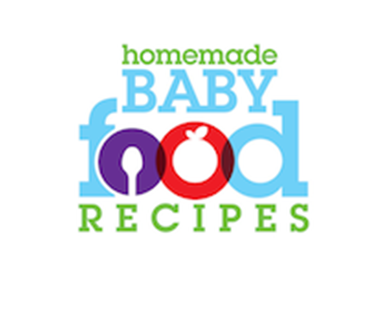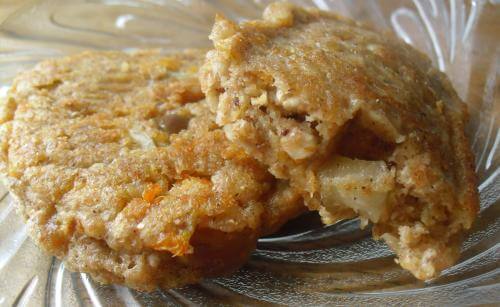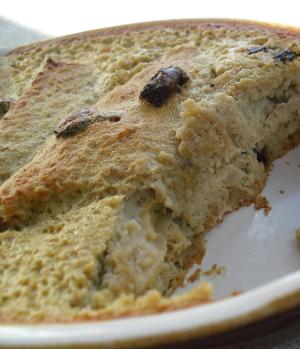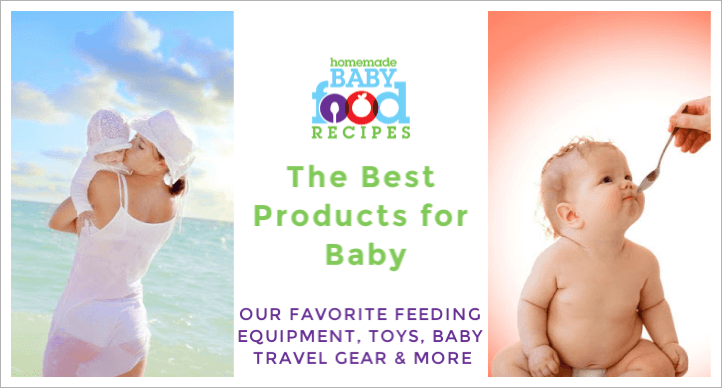Eggs Baby Food Recipes and Ideas – Delicious Dishes to Please Your Tiny Diner
Welcome to our eggs baby food recipes page, where we look at WHY eggs are such a healthy food for your baby and HOW to cook them in ways he’ll love!
When it comes to creating nutritionally superior baby food, no-one does it quite like Mother Nature!
Eggs are proof in point – perfectly portioned and with a delicate flavour that can be used effectively in sweet or savoury recipes, eggs are simply PACKED with nutrients that are particularly important for your growing baby.
When can I introduce eggs to my baby?
Up until recently, medical experts have tended to recommend that babies under 12 months be given egg yolks ONLY, with the whites being introduced after baby’s first birthday.
This is because the white of an egg is more likely than the yolk to trigger an allergic reaction, which can sometimes be severe.
However, current research suggests that there may be no benefit in delaying the introduction of egg whites and that this will not prevent their triggering an allergic reaction in a sensitive baby.
Therefore, most medical professionals now recommend that babies be introduced to whole eggs – the yolks AND the whites – from 6 months of age, if there is no family history of food allergy.
Nevertheless, we strongly recommend that you discuss the introduction of eggs with your child’s doctor.
Reactions to eggs can be very serious, so it is essential that your child’s doctor – who is familiar with your family’s medical history – advise you about the best time to include them in your baby’s diet.
We have lots more egg allergy information here
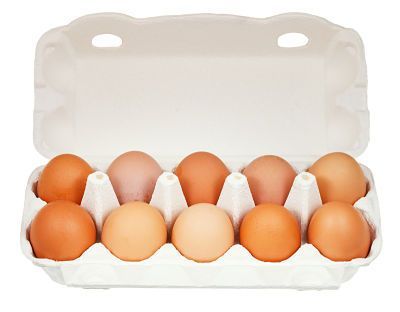
Why are eggs such a healthy food for baby?
Eggs are chock-full of high quality nutrients for your baby including…
- choline – a B vitamin that plays an important role in the development and function of your baby’s brain and is also needed for general good health!
- DHA – an omega-3 fatty acid (one of the ‘healthy fats’), also found in breast milk, provides further support for the development of baby’s brain.
- protein – the protein in eggs is ‘complete’, making eggs particularly useful in a meat-free diet.
- folate – which plays an important role in the production and maintenance of new cells within the body.
- vitamin D – eggs are actually one of the very few food sources of this important nutrient
- lutein – an antioxidant that protects the eyes against damage from the sun and can help prevent cataracts and age-related eye problems in later life. Eggs provide lutein in a form that’s particularly easy for the human body to absorb.
- minerals – including iron, zinc and selenium (a great immunity booster).
Furthermore – and contrary to popular belief – eggs do NOT raise the body’s levels of ‘bad’ cholesterol, nor do they contribute to heart disease.
Whilst both the yolk and the egg white are nutritious (the protein level in the white only slightly higher), the yolks actually contain the bulk of the nutrients – good news if you decide to give your baby ‘yolks only’ at first.
Choosing eggs for your baby food recipes
Eggs from the grocery store tend to be clearly labelled with a ‘best before’ or ‘use by’ date, so it’s generally an easy task to ensure that the eggs you are buying for your baby are safe.
If you buy them directly from a farm or other source where they may not be labelled, be sure to check that they are fresh and have been stored under refrigeration.
Some eggs have brown shells and some have white…
…but there is no difference between the two in terms of quality, nutrition or taste!
ORGANIC EGGS
Whilst non-organic eggs are, of course, considered perfectly safe for consumption – particularly since safety procedures have been tightened to avoid contamination issues – many people prefer to buy organic eggs.
If available in your area, we really recommend giving them a try – aside from the better-known benefits of organic foods, we feel that organic eggs have a richness of flavour that’s absent from regular eggs!
STORING EGGS
More egg baby food tips from our blog…
Completely fresh eggs should be good in the fridge for up to one month – but be sure to store them in the back of the fridge (NOT the door!).
Your fridge door may have one of those handy egg holders in it, but it’s also the warmest spot in the fridge… not ideal for the storage of eggs at all, particularly those intended for your baby!
Preparing eggs for baby
Eggs can be cooked in lots of ways, including boiling, poaching, frying and even baking!
Whichever method you choose, it’s very important to cook eggs THOROUGHLY for your baby – and that includes the yolk.
This post from our blog explains why it is NOT safe to give your baby undercooked eggs, even when the eggs are organic.
If you want to separate the egg whites from the yolks, then you have a few options.
- You can hard boil the eggs (see tips below), allow them to cool, then easily remove the yolk from the white.
- You can crack a raw egg, then tip the egg yolk back and forth between the two shell halves, allowing the white to drain into a bowl.
- You can splash out on an Egg Separator (from Amazon)
HOW TO HARD BOIL EGGS FOR YOUR BABY
If you’ve always cooked hard boiled eggs by boiling them continuously for 10 minutes or so, then you might be surprised to find that it’s NOT actually the best way to do it!
It tends to make the egg whites rather rubbery and unpleasant – and can also cause the outside of the yolk to go a little green.
Using the following method provides lighter whites (and uses less power!).
- Put your eggs in a pan and cover with cold water (if you drop them straight into hot water, they tend to crack).
- Bring the water to a boil and boil for 1 minute.
- Remove the pan from the heat and set aside, covered, for 20 minutes.
- Peel when cool.
Hard boiled eggs should be stored in the fridge and used within 48 hours.
Handy tip…
Putting a little vinegar into the cooking water when you boil eggs prevent the whites from running into the water if the egg shells crack!
Eggs baby food ideas
Can you think of an ingredient more versatile than the egg?
Thanks to their neutral flavour, you can add eggs to just about anything, supplying your baby with a valuable boost of nutrients with very little effort… and without his even noticing!
Here are some great ways to incorporate eggs into your baby’s daily diet…
- Cut hard boiled eggs into pieces and serve as a gummable finger food.
- Beat a raw egg yolk in a bowl, then stir it into oatmeal (porridge) at least 5 minutes before the end of the cooking time. Stir well, until cooked.
- Crumble cooked egg yolk into purees, soups or just about any other food that your baby enjoys! It makes a good thickener if your purees are runny.
- Mash cooked egg yolk with ripe avocado – this makes a highly nutritious and tasty toast topper or sandwich filling.
- Turn leftover veggies into something eggs-traordinary – just pop them into a small, ovenproof dish, pour in a couple of beaten eggs, top with grated cheese and cook in the oven at 375 deg F, until the eggs are completely cooked and the cheese is golden.
- Scramble whole eggs until well done to serve as a squishy finger food, or scramble the yolks by themselves (a little harder to pick up and best served from a spoon!
Eggs baby food recipes
Did you know…
…That eggs are great for mummy and daddy too?
Research has shown that eating eggs for breakfast really satisfies the appetite, preventing over-eating and snacking later in the day and contributing to weight loss!
Carroty Custard
This simple recipe creates a texture similar to a creamy puree. It is extremely delicate in flavour, so try ‘jazzing’ it up for older babies with the addition of herbs (thyme goes well!)
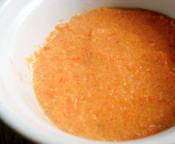
3 oz (1/3 cup) cooked, pureed carrots
4 fl oz (1/2 cup) milk (use whole milk, breast milk or formula)
1 egg yolk
- Place the pureed carrot in a small saucepan and beat in the egg yolk and milk.
- Heat the mixture over a medium heat, stirring constantly.
- When the mixture has thickened, remove from the heat and allow to cool to a safe serving temperature.
Easy Cheesy Scramble
1 egg (yolk only if you prefer)
2 tbsp whole milk, breast milk or formula
1 tbsp grated Cheddar cheese
1 tbsp olive oil
- Heat the olive oil in a small frying pan.
- Whisk together the egg and milk, then stir in the cheese.
- Pour the mixture into the pan and cook for several minutes, stirring constantly, until the egg is cooked through.
- Add snipped fresh chives or a tbsp of very finely chopped cooked veggies to provide a little variety.
Versatile Veggie Omelet
2 eggs
2 tbsp natural yogurt
2 tbsp chopped cooked veggies: try eggplant, zucchini, mushrooms, carrot, peas or tofu dice
1 tbsp olive oil
- Heat the olive oil in a small frying pan.
- Beat together the eggs and yogurt, then stir in the cooked veggies.
- Pour into the pan and cook for a few minutes until the underside is golden and the eggs are cooked through.
- Either turn the omelet over carefully in the pan to cook the other side, or place under a preheated grill/broiler to finish the top.
- Cool to a safe serving temperature and cut into bite-sized pieces. A perfect dish to eat with fingers!
For a flavour boost, add a small handful of grated cheese before placing the omelet under the grill/broiler.
Egg-cellent Tuna and Broccoli Surprise
2 tbsp canned tuna
1 cooked broccoli floret, chopped
1 tbsp grated Cheddar cheese
3 tbsp whole milk, breast milk or formula
1 small egg white plus one small egg
- Preheat the oven to 375 deg F (180 deg C).
- Grease a 6 oz ramekin or mini souffle dish and place on a baking sheet.
- Put the cooked broccoli at the bottom of the ramekin then spoon in the tuna.
- Top with the cheese.
- Whisk together the egg white, egg and milk.
- Pour this mixture over the ingredients in the ramekin, then place in the oven.
- Cook for 20-30 mins, until the eggs are cooked through and the top is golden.
Sweet Potato Pizza with Eggy Topping
A wonderful finger food for older babies who are biting and chewing.
1 sweet potato biscuit, cut in half
1 to 2 tbsp tomato paste or chopped, cooked tomato (optional)
2 tbsp grated Mozzarella cheese
1 large egg
- Preheat the oven to 375 deg F (180 deg C).
- Place the sweet potato biscuit halves, cut side up, on a baking sheet.
- Spread them with the tomato paste or chopped, cooked tomato (if using).
- Meanwhile, beat the egg and scramble it in a small frying pan.
- Divide the scrambled egg between the two biscuit halves and top with the cheese.
- Cook in the oven for 5 to 10 mins, until the cheese has completely melted, then cool and serve.
Sweet Potato Tortilla
This dish is a variation on Spanish tortilla and has nothing to do with the ‘bread’ version of tortilla! This is a tasty dish served hot or cold and is an excellent finger food for self-feeding.
2 tbsp olive oil
1/2 small onion, sliced
1 cooked sweet potato, peeled and sliced thinly
3 eggs
- Heat the olive oil in a small frying pan and saute the onion over a very low heat until soft.
- Add the sliced sweet potato and stir well.
- Beat the eggs together, then pour them over the contents of the pan.
- Turn the heat as low as it will go and cover the pan.
- When the tortilla seems fairly well set and only a little wet on top (around 20 to 30 mins later), run a palette knife around the edge to loosen it and turn it on to a plate. Carefully slide it back into the pan and cook for a further 5 to 10 mins, until cooked through.
- Remove from the pan and cool.
Savoury Spinach Scramble
2 eggs, beaten
1 tsp oil
2 tbsp finely chopped onion
4 oz (1/2 cup) frozen spinach, thawed
2 tbsp natural yogurt
- Heat the oil in a small pan and saute the chopped onion for a few minutes, until tender.
- Mix the beaten egg with the natural yogurt and spinach.
- Pour the egg mixture into the pan and cook for a few minutes, stirring, until the egg is cooked through.
Easy Creamy Eggy Veggies
1 egg
2 tbsp cottage cheese
1 tbsp finely chopped cooked vegetable of your choice
- Preheat the oven to 375 deg F (180 deg C).
- Beat the egg with the cottage cheese. Stir in the chopped veggies.
- Grease a ramekin/mini souffle dish and pour in the egg mixture.
- Place the ramekin on a baking sheet and cook for around 20 mins, until the egg is set.
Creamy Egg Puree with White Beans
This recipe is ultra-simple and can be served warm or cold (making it a great meal to pack if you’re out and about with your baby). We use it often as a sandwich spread or a toast topper, but it’s also a lovely, velvety puree to serve straight from the spoon!
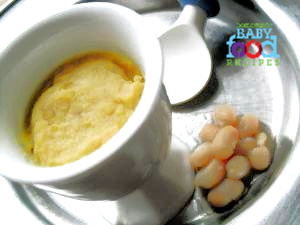
1 cooked egg yolk
1 tbsp white beans (we used navy beans)
2 tsp milk
- Simply puree all three ingredients together, adding more milk for a thinner consistency.
Oh-So-Simple Baked Egg
1 egg
1/2 clove garlic, crushed (optional)
1 tbsp cream (you can use milk if you prefer, but cream is wonderful and babies need a little fat!)
1 tbsp grated Cheddar cheese
large pinch of fresh dill (chopped) or a small pinch of dried dill
- Pre heat the oven to 375 deg F (180 deg C).
- Place the crushed garlic in a greased ramekin/mini souffle dish and pour in the cream.
- Add the dill, then break the egg into the ramekin.
- Top with the grated cheese, then place on a baking sheet.
- Cook for 15 to 20 mins, until the egg is cooked through.
Egg and Bean Breakfast (or Lunch!)
2 tsp olive oil
1/2 clove garlic, crushed (optional)
6 oz (3/4 cup) cooked kidney beans, red or white (use salt free or low sodium canned beans – rinsed well – if you prefer)
2 tbsp low sodium or homemade vegetable stock
1 egg, beaten
2 tsp grated Parmesan cheese
- Heat the olive oil in a small pan and saute the garlic for 1 min, until tender.
- Pour in the stock and add the beans. Warm through gently, stirring well.
- Puree the mixture either by using a hand blender or transferring to a food processor. Add a little more stock if the mixture is too dense.
- Set aside and keep warm. Add a little more oil (if necessary) to the pan you just used and pour in the beaten egg.
- Cook the egg, stirring continuously, until done.
- Finally, stir the scrambled egg into the bean puree and serve, topped with the grated cheese.
A yummy finger food recipe with eggs…
A sugar free fruity treat…
Homemade baby food equipment…
Homemade baby food accessories
